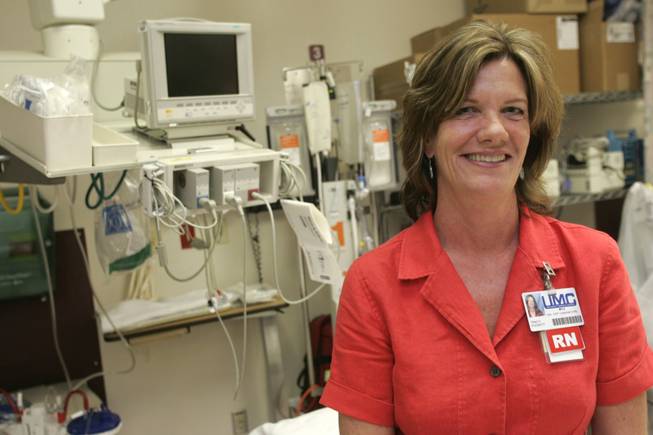
Tracy Puckett says the best way to prevent the spread of flu is to use “good respiratory etiquette,” that is cover your mouth when you cough and your nose when you sneeze.
Friday, Aug. 28, 2009 | 2 a.m.
Sun Coverage
If you really want to make Tracy Puckett happy, try washing your hands.
And by all means, cover your mouth with a tissue when you cough or sneeze!
Puckett, a registered nurse, is director of infection control and critical care at University Medical Center, the county hospital. This month, the President’s Council of Advisors on Science and Technology released its report on the H1N1 virus, also known as swine flu, and the possible epidemic it could cause during this year’s flu season.
According to the report, it’s plausible that the H1N1 influenza virus could infect up to half the U.S. population this fall and winter, leading to as many as 1.8 million hospital admissions and 90,000 deaths.
What makes Las Vegas unique in terms of spreading a virus like H1N1?
We’re fortunate that flu likes cold and damp and we don’t have those conditions. But we’re at higher risk because we have a lot of visitors from all over the world.
People tend to not use good respiratory etiquette — they sneeze and it flies. H1N1 is spread by droplets of moisture that come out when people cough and sneeze. Then the virus can live for a few hours on a surface, where it can be picked up.
How do you think H1N1 will play out?
I’m following what’s going on in Australia, which is currently in its flu season. So far their infection rates and deaths are similar to a typical flu season. We are not seeing the worst-case scenario in Australia, but we do need to protect ourselves and be prepared.
Who is most at risk?
Children and people up to age 24, and then all people with an underlying illness. One thing unique with H1N1 is that it’s not affecting the elderly like a seasonal flu. The theory is that people over age 50 might have some immunity from the 1976 swine flu.
What is UMC doing to prepare for the possible H1N1 spread?
Since 9/11 we have been directed by Joint Commission to have a surge-of-patients plan that includes opening hospital beds by triaging patients and discharging those who we can, and calling in additional staff. Regionally, we are actively working with Clark County, the Southern Nevada Health District and the Nevada Hospital Association on emergency planning.
What precautions should we take?
Use excellent hand hygiene. Wash your hands when they are visibly soiled, when you’ve been around anyone sick, before you eat and after you go the bathroom. If you can’t get to soap and water use a really good hand sanitizer. If you have a cough or a sneeze, make sure you use a tissue so it doesn’t fly into the air. If you’re sick, and have any symptoms, you should stay home. People should get their regular flu shots. Seasonal flu is still going to happen.
Will the H1N1 virus improve these hygiene habits?
I’m looking for a silver lining here. I’m seeing people being a little more mindful of washing their hands and covering their cough. You’re seeing more hand sanitizer in public, grocery stores. That’s good. If we have a healthier population because we’re thinking, that would be great.

Join the Discussion:
Check this out for a full explanation of our conversion to the LiveFyre commenting system and instructions on how to sign up for an account.
Full comments policy